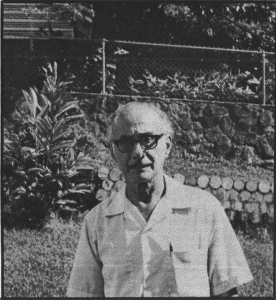John Vegas

Kalihi: Place of Transition
This project features life history interviews with present and former longtime residents of Kalihi, a multi-ethnic working-class district located west of downtown Honolulu, which has a long history as a home of island immigrants.
John Vegas, Puerto Rican, the sixth of fifteen children, was born on November 30, 1912, in North Kohala, Hawaii. His parents immigrated to North Kohala from Puerto Rico in 1901. Antone Vegas, John's father,worked as a laborer at Kohala's Union Mill Plantation. In 1924, the family moved to Honolulu where Antone Vegas worked as a track layer for Honolulu Rapid Transit (HRT). They rented their first home in Honolulu near Middle and Rose Streets in Kalihi. From there, the family moved to different homes in the Kalihi area. John attended Likelike School where he completed the fifth grade. In 1933, John began his career as a carpenter and boat builder at Pearl Harbor Naval Shipyard, where he remained until his retirement in 1967. Today, John lives in Kalihi Valley with his wife, Nora. They have four children. John has never abandoned his love for woodwork, spending much of his time working on his house. He is also an active member of the United Puerto Rican Association of Hawaii and Our Lady of the Mount Church.
Scope and Content Note
The evolution of the United Puerto Rican Association and activities at Pearl Harbor on December 7, 1941 are among the topics discussed in this interview with a long-time Kalihi Valley resident.
Program Note:
This interview is part of the Center for Oral History's project Kalihi: Place of Transition. Interviews from this project are available in the Center's ScholarSpace open access repository.
The Center for Oral History (COH), in the Department of Ethnic Studies at the University of Hawaiʻi at Mānoa, collects, documents, preserves and highlights the recollections of Native Hawaiians and the multi-ethnic people of Hawaiʻi. It produces oral histories and interpretive historical materials about lifeways, key historic events, social movements and Hawaiʻi’s role in the globalizing world, for the widest possible use.
Please Note: The oral histories in this collection are protected by copyright and have been created for educational, research and personal use as described by the Fair Use Doctrine in the U.S. Copyright law. Please reach out Voices@noaa.gov to let us know how these interviews are being used in your research, project, exhibit, etc. The Voices staff can help provide other useful resources related to your inquiry.
The NOAA mission is to understand and predict changes in climate, weather, oceans, and coasts, to share that knowledge and information with others, and to conserve and manage coastal and marine ecosystems and resources. The Voices Oral History Archives offers public access to a wide range of accounts, including historical materials that are products of their particular times, and may contain offensive language or negative stereotypes.
Voices Oral History Archives does not verify the accuracy of materials submitted to us. The opinions expressed in the interviews are those of the interviewee only. The interviews here have been made available to the public only after the interviewer has confirmed that they have obtained consent.
